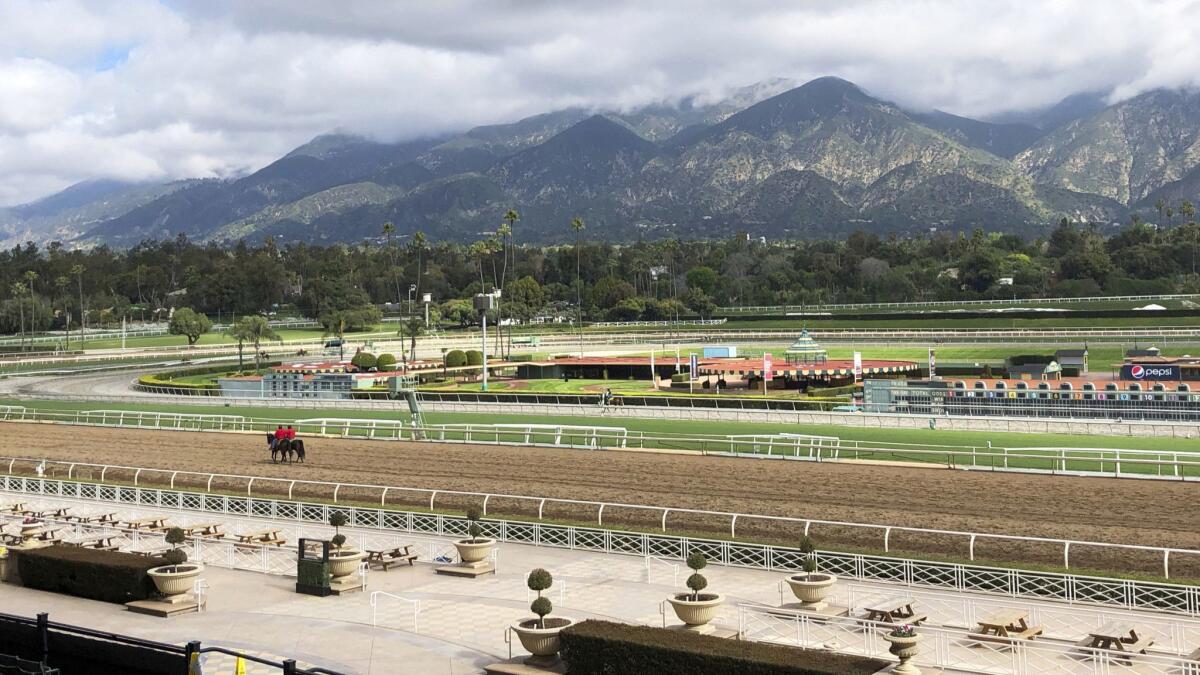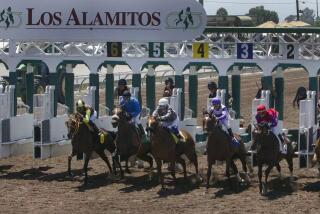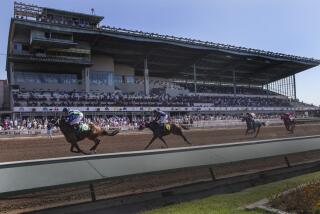Another horse fatality at Santa Anita; 24 thoroughbreds have died since Dec. 26

Santa Anita’s unprecedented run of six weeks without an equine fatality ended Friday morning when Commander Coil broke down during light training with a shoulder injury and was subsequently euthanized.
The track’s streak was at about 7,000 timed workouts and race starts when Commander Coil sustained the fatal injury. The incident did not occur during a timed workout but at a less-stressful gallop, which virtually every horse does almost every day. It’s estimated that there have been well in excess of 50,000 gallops since the last fatality. Because of the nature of the injury, this fatality likely will fall under the category of catastrophic death.
The last fatality was March 31 when Arms Runner went down while on the dirt crossover of the downhill turf course. The course has subsequently been closed to sprint racing.
Commander Coil, a 3-year-old gelding, was the 24th death since Dec. 26. The horse was an unraced Colorado-bred trained by Marcelo Polanco and owned by Jose Romero.
While Commander Coil’s injury was mostly unnoticed in the quiet of a routine training and workout session, Pimlico Race Course in Baltimore, Santa Anita’s sister track, had a very public death Friday when Congrats Gal collapsed just past the finish line after being eased through the final sixteenth of a mile of the Grade 3 Miss Preakness Stakes for 3-year-old fillies.
Her death will not likely be considered a catastrophic injury because the horse did not break down and was not euthanized. No cause of death was immediately announced, but generally when a horse dies in that manner the cause is often a heart attack.
A necropsy will be performed on both horses.
“Congrats Gal suffered sudden death after the eighth race [Friday],” the Maryland Jockey Club and the Stronach Group said in a statement. “The incident occurred after the wire. Commission veterinarians attended to the horse immediately. Our thoughts go out to all of the owners, trainers and connections of Congrats Gal.”
Congrats Gal was making her sixth start and had won her last two races.
Horse safety has become one of the biggest issues in the industry after the spate of deaths while training or racing at Santa Anita between Dec. 26 and March 31. The fact that Santa Anita went so long without a fatality is almost as big of a statistical anomaly as the original cluster of deaths.
“Santa Anita’s new rules slowed the bloodbath, but the death of Commander Coil on Friday morning shows more must be done,” said Kathy Guillermo, senior vice president of the People for the Ethical Treatment.
While the number of deaths has greatly subsided, the track has remained under a microscope.
The California Horse Racing Board has four full-time investigators on the Santa Anita deaths and has issued more than 70 subpoenas for documents. Los Angeles County Dist. Atty. Jackie Lacey announced that a task force is being created to investigate the deaths and is working with the CHRB.
U.S. Sen. Dianne Feinstein of California has called for the CHRB to suspend racing until an investigation of the deaths is conducted. U.S. Rep. Judy Chu (D-Monterey Park) has called for a congressional hearing and investigation. Two state legislators say they will hold a hearing on the horse deaths soon.
It’s unclear whether there will ever be a definitive answer for the rise of deaths at the 85-year-old track. Tim Ritvo, chief operating officer of the Stronach Group, has continually referred to causation as being “multi-factorial.”
The track has brought in soil experts in the hopes of finding what was causing the unusually high number of deaths. Nothing unusual has been found.
“I really think the weather caused a lot of this,” said Bob Baffert, a Hall of Fame trainer. “It was getting to the point where there was nobody out there defending us. You don’t have to burn the house down because the pipes are bad. We can work through this.”
In an effort to show the public that the sport was committed to change, Belinda Stronach, president and chief executive of the Stronach Group, put forth several safety initiatives. Most involve the use of medication. The amount of Lasix, a drug that allows horses to breathe easier, is being reduced on race day and will eventually be eliminated when horses run races. Other medications are also being eliminated. California already has some of the toughest medication rules in the U.S., and now they are even more strict.
More to Read
Go beyond the scoreboard
Get the latest on L.A.'s teams in the daily Sports Report newsletter.
You may occasionally receive promotional content from the Los Angeles Times.











